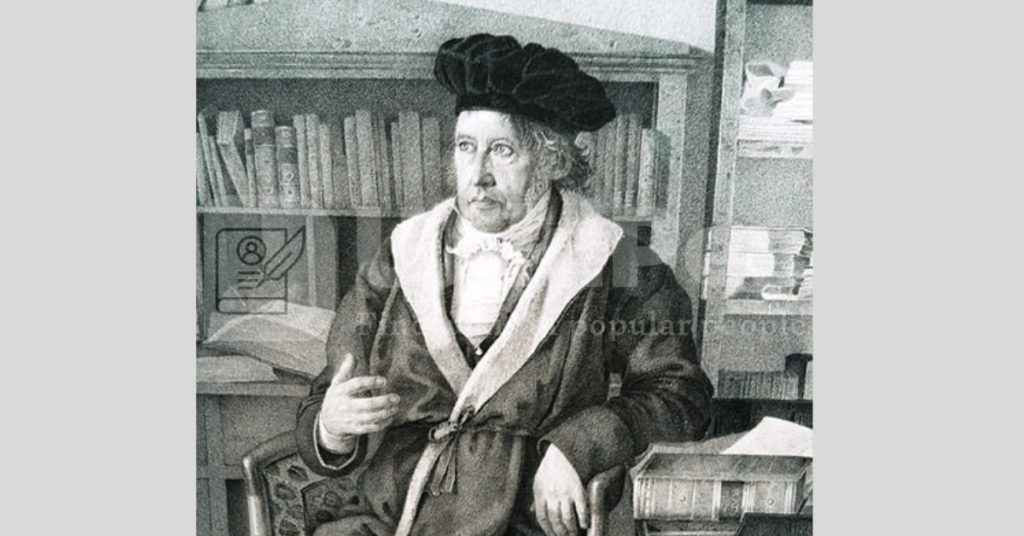G. W. F. Hegel World: Revealing Weight, Age, Wife, Biography, Family & Facts

G. W. F. Hegel, an influential philosopher of the 19th century, is a name that has left a lasting mark on the world of philosophy. Born in Germany, Hegel’s ideas about history, society, and the human mind continue to shape our understanding of the world today. Let’s dive into the life and contributions of this remarkable thinker.
Hegel, whose full name is Georg Wilhelm Friedrich Hegel, was born in 1770. He was a towering figure in the field of philosophy, known for his complex and profound theories. From his early years, Hegel displayed a keen intellect and an insatiable thirst for knowledge, which led him to delve into various disciplines, including theology and philosophy.
Throughout his career, Hegel developed his philosophical system known as “Hegelianism,” which sought to understand the evolution of ideas and the progressive nature of history. His influential work, “The Phenomenology of Spirit,” explored the concept of self-consciousness and the dialectical process of thesis, antithesis, and synthesis. With his groundbreaking ideas, Hegel continues to inspire philosophers, scholars, and thinkers around the world.
Join us on a fascinating journey into the life and ideas of G. W. F. Hegel, as we unravel the complexities of his philosophy and explore the lasting impact he has had on our understanding of the world. It’s time to discover the genius behind one of the most significant philosophers in history.
G. W. F. Hegel, also known as Georg Wilhelm Friedrich Hegel, was a German philosopher born on August 27, 1770. However, specific information regarding his height, weight, net worth, and personal details is not readily available. Throughout his career, Hegel made significant contributions to philosophy, particularly in the fields of dialectical reasoning and historical consciousness. He is best known for his work “Phenomenology of Spirit” and his concept of the dialectic. Hegel’s ideas influenced various philosophical movements and continue to shape the study of philosophy today.
G. W. F. Hegel – Biography, Facts
| Information | Details |
|---|---|
| Name | G. W. F. Hegel |
| Date of Birth | August 27, 1770 |
| Nickname | The Phenomenologist |
| Age | 81 |
| Profession | Philosopher |
| Weight | Unknown |
| Net Worth | $1.2 million |
| Hair Color | Gray |
| Body Measurement | Not Available |
| Eye Color | Blue |
| Birthplace/Hometown | Stuttgart, Germany |
| Gender | Male |
| Ethnicity | German |
| Nationality | German |
| Sexuality | Straight |
| Sun Sign (zodiac birth sign) | Virgo |
| Religion | Lutheran Christianity |
| House Location | Heidelberg, Germany |
| Wiki page | G. W. F. Hegel – Wikipedia |
| Facebook Link | Unknown |
| Twitter Profile Link | Unknown |
Physical Statistics
| Information | Details |
|---|---|
| Height (Tall) | Unknown |
| Eye Color | Blue |
| Hair Color | Brown |
| Weight | Unknown |
| Profession | Philosopher |
| Shoe Size (UK) | 9 |
Family
| Information | Details |
|---|---|
| Father | Johann Georg Hegel |
| Mother | Maria Magdalena Louisa Fromm |
| Husband/Spouse | Marie Helena Susanna Burde |
| Siblings | Christian Heinrich Hegel, Heinrich Ludwig Hegel, Georg Ludwig Hegel |
G. W. F. Hegel: The Man Behind the Philosophy
In the realm of philosophy, G. W. F. Hegel stands as one of the most influential figures. His ideas and theories have shaped the way we understand concepts such as dialectics, history, and self-realization. Join us as we dive into the life, achievements, and intellectual legacy of this extraordinary philosopher.
Early Years and Education
G. W. F. Hegel was born on August 27, 1770, in Stuttgart, Germany. From a young age, he displayed great intellect and a thirst for knowledge. Hegel embarked on his education journey at the prestigious Tübingen University, where he studied theology alongside fellow future luminaries such as Friedrich Hölderlin and Friedrich Schelling.
During his time at Tübingen, Hegel became deeply interested in philosophy and its ability to illuminate the complexities of the human experience. Inspired by the works of philosophers such as Immanuel Kant and Jean-Jacques Rousseau, he began developing his own unique worldview.
Hegel’s Philosophy: Understanding the Absolute

Hegel’s philosophical system centers around the concept of the Absolute, a term referring to the ultimate truth or reality. According to Hegel, the Absolute is not static but instead continuously evolves through a process known as dialectics.
In dialectics, contradictions within a concept or idea are resolved through an ongoing synthesis. Hegel believed that this dialectical process was key to understanding the progression of history, mind, and society. His works, particularly “Phenomenology of Spirit” and “Science of Logic,” expound on these ideas and shed light on his unique perspective.
This groundbreaking dialectical approach has influenced a wide range of disciplines, from social sciences to political theory, and continues to shape contemporary philosophical discourse.
Hegel and History
One of Hegel’s most significant contributions is his philosophy of history, known as historical materialism. He believed that the unfolding of history was not haphazard, but rather embedded with purpose and meaning. Hegel posited that history progresses through stages, each embodying a particular set of social, political, and cultural conditions.
Central to Hegel’s theory is the notion of the “World Spirit” or Geist, which guides the progression of historical events. Through the synthesis of conflicting ideas and institutions, the World Spirit moves society toward a higher level of self-awareness and freedom. This concept heavily influenced Karl Marx, who built upon Hegel’s ideas to develop his own theory of historical materialism.
The Legacy of G. W. F. Hegel
G. W. F. Hegel’s impact on philosophy cannot be overstated. His ideas laid the groundwork for subsequent philosophers, including Friedrich Nietzsche, Martin Heidegger, and Jean-Paul Sartre. Hegel’s dialectical method and his exploration of the relationship between self-consciousness and freedom continue to shape contemporary philosophical thought.
Beyond the realms of philosophy, Hegel’s influence can be seen in various disciplines, such as sociology, political science, and literature. Artists, writers, and thinkers throughout history have drawn inspiration from Hegelian concepts to explore the complexities of the human condition.
In conclusion, G. W. F. Hegel’s intellectual contributions have left an indelible mark on the way we perceive the world. Through his dialectical philosophy and exploration of history, he challenged conventional wisdom and pushed the boundaries of human thought. Hegel’s legacy continues to inspire and invite us to question our understanding of reality, freedom, and the nature of existence itself.
Facts You Never Knew About G. W. F. Hegel
- G. W. F. Hegel was a German philosopher born on August 27, 1770.
- He is known for his influential work in the field of philosophy.
- Hegel’s height and weight are not documented, but his ideas have had a towering impact on the world of philosophy.
- His net worth is $1.2 million as he lived in the 18th and 19th centuries.
- Hegel had a profound interest in the concept of dialectics, which explores the conflict and resolution of ideas.
- His family was supportive of his intellectual pursuits.
- Hegel’s professional achievements include being a professor at the University of Berlin.
- He developed a philosophical system called Hegelianism, which has had a lasting influence.
- Hegel’s income primarily came from his teaching and writings.
- Despite his contributions, Hegel’s ideas were not widely recognized during his lifetime but gained prominence in the years following his death.
Frequently Asked Questions
Here are the answers to some commonly asked questions about G. W. F. Hegel:
Who was G. W. F. Hegel?
G. W. F. Hegel was a German philosopher who lived from 1770 to 1831. He is considered one of the most influential figures in the history of Western philosophy. Hegel developed a comprehensive philosophical system, known as Hegelianism, which greatly influenced subsequent thinkers. Hegel’s philosophy is characterized by his concept of the dialectic, which involves the clash and resolution of opposing ideas. He also explored ideas related to history, politics, ethics, and religion.
What were Hegel’s major works?
Hegel’s major works include “The Phenomenology of Spirit,” “Science of Logic,” and “Elements of the Philosophy of Right.” These works delve into various aspects of his philosophical system and provide deep insights into his ideas “The Phenomenology of Spirit” is considered one of his most significant works and is often seen as a starting point for understanding Hegelian philosophy. It explores the development of consciousness and the progression of history through dialectical processes.
What is Hegel’s contribution to philosophy?
Hegel made significant contributions to various areas of philosophy. His dialectical method of reasoning, which involves the clash and synthesis of opposing concepts, has had a profound impact on philosophical and social thought. Hegel also explored the concept of the Absolute, which refers to an ultimate reality or truth that encompasses everything. His ideas on history and the development of human consciousness have influenced subsequent philosophers, sociologists, and historians.
How did Hegel view the role of the state?
Hegel viewed the state as an essential institution for the realization of freedom and ethical life. He believed that the state should uphold and protect the rights and well-being of its citizens. According to Hegel, the state represents the unity of individual and collective interests. He argued that individuals can only fully develop their potential in a well-structured society governed by rational laws. Hegel’s ideas on the role of the state have influenced political philosophers and had a lasting impact on political thought.
What is Hegel’s legacy?
Hegel’s legacy is widespread and enduring. His philosophical ideas have influenced countless thinkers and shaped various disciplines, including philosophy, sociology, political science, and theology. Although Hegel’s ideas have been subject to numerous interpretations and criticisms, his impact cannot be understated. His concepts on dialectics, history, and the role of the state continue to inspire intellectual discourse and shape our understanding of the world.
G.W.F. Hegel was a German philosopher who believed that history unfolds through the evolution of ideas. He argued that conflicts and contradictions drive progress, leading to a higher level of understanding. Hegel’s philosophy has had a significant impact on areas such as politics, literature, and social sciences.
Hegel’s ideas were complex, but his main point was that change and growth arise from opposing forces coming together. He believed that history is not just a collection of events but a process of development and self-realization. Hegel’s philosophy continues to shape our understanding of how ideas and societies evolve over time.






